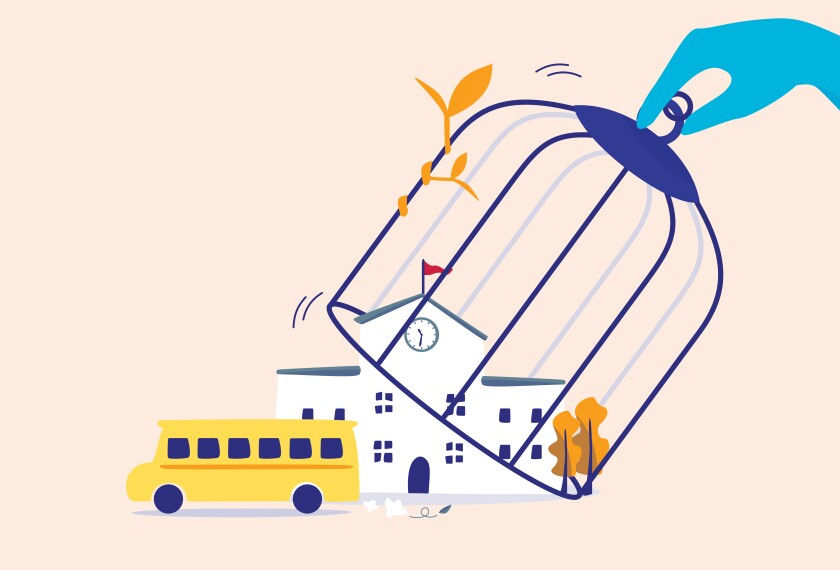The maxim “follow the science” has guided education policymakers over the past year of COVID-19. Emerging findings about the benefits of masks, the need for regular testing, and the risks of airborne virus transmission have informed and transformed mandates for local schools. Still, many of the decisions that schools must make as they reopen for in-person learning rest on incomplete or contested science. Think about the questions on which scientific consensus has shifted in the past year: Are 3 feet of distance between desks enough or must there be 6? Do young children wearing masks still put adult staff members at risk? Is daily deep cleaning of classrooms really worth the cost? Educators can only “follow the science” so far.
Recently, researchers have issued quantitative estimates of “learning loss.” Though important for public policy, they offer little guidance to teachers and administrators as they decide what to do next in their school. Similarly, resuming standardized testing is unlikely to tell teachers what they need to know about where their students stand academically and what they will need this spring and next year. If educators are to address their school’s challenges effectively, they must begin by understanding them. To do so, they must rely not only on science but on their shared professional expertise and insider’s knowledge of their school.
Every school is different. If reopening means more than solving problems of space, ventilation, and safety, then school-based educators will first need to make sense of the past year and then tailor their responses to their students’ current academic, social, and mental-health needs. Whatever their school’s goals—a return to normalcy or a vigorous pursuit of a new kind of schooling—teachers and principals must take careful stock of where they’ve been throughout the pandemic and where they are, before deciding where to go and how to get there.
Worthwhile school-based inquiries are not simply the sum of individual reflections or survey responses. Rather, they require sustained, candid conversations that engage teachers and administrators schoolwide in understanding how they and their students experienced and responded to the challenges of remote or hybrid teaching. If educators are to move forward together and develop a coherent recovery and development plan for their school, they will have to take into account the losses, gains, and lessons of the past year.
First, teachers must understand their own experience and that of their colleagues. What did they learn about their strengths, weaknesses, and preferences, as well as those of their peers? How well did their instruction work for them and their students? How did they assess students’ learning, give feedback, and provide extra help? Did they discover effective ways to teach online that might be incorporated into future hybrid and in-person instruction?
Second, how have students fared, and what will they need as they return to school? What did online learning reveal about their interests, learning styles, and need for social interaction? Are there patterns of difference in students’ experiences by race, ethnicity, gender, or family income? What might teachers do to build (or rebuild) a positive school culture as they and their students return after more than a year of isolation? How can the school approach short-term decisions, such as which students are promoted and longer-term revisions of their curriculum and instruction?
Third, after a year of online or hybrid instruction, what do parents expect of the school, and what role do they hope to play in their children’s learning? As one district administrator told me, parents and teachers “have literally been observing each other in their own homes.” Have these observations enhanced or frayed relationships between the school and families?
If a school’s collaborative work is to inform and serve staff, students, and parents, all teachers must become engaged.
Given these and other pressing questions, what can principals do to support thoughtful review of the past and informed planning for the future? They must ensure that the urgency to comply with mandates and resume normal routines does not shut down efforts to candidly take stock of past practices and reimagine new, better, more equitable ones. Recently, a teacher said that she was grateful for the online team meetings that her school held throughout the pandemic. But her principal recently cautioned, “Don’t get used to them,” because when in-person school resumes, there won’t be enough time. In addition to protecting time for review and planning, school leaders should regard teachers as partners, soliciting their views and integrating those ideas into schoolwide perspectives and plans.
Teachers, too, must step up. After months of isolation and self-reliance, some will be inclined to retreat back to their classroom rather than invest in their school’s process of review and planning. But if a school’s collaborative work is to inform and serve staff, students, and parents, all teachers must become engaged. For when teachers contribute their perspectives and explore alternative responses together, they are better prepared to design and refine a successful plan. Because a school’s students will move through the school from class to class and grade to grade, schoolwide approaches should be coherent, though not lockstep.
What is at stake? Obviously, the foremost concern is students’ well-being and learning. However, schools should also recognize the threat of unexpected disruption caused by teacher and administrative turnover. Many staff members will have weathered more than a year of stress, disappointment, loss, and even public scorn. As the school year ends, they will decide whether or not to return, resign, or retire. Meanwhile, new teachers who have missed an induction process may doubt that their school is the right place for them. If teachers know through experience that they can rely on their colleagues for support and learning, that their views are valued and their suggestions heard, schools can avoid unnecessary turnover. And, as teachers’ joint work pays off, their success with students will enhance their satisfaction and fuel their ongoing commitment.





